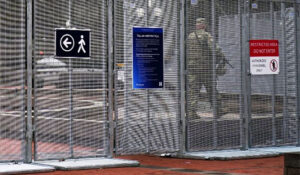Special to WorldTribune.com
 By Bill Juneau
By Bill Juneau
In anticipation of opening arguments in the George Floyd trial, the courthouse in downtown Minneapolis has become a fortress surrounded by coil-wired fence and security officers. Down the street at the “George Floyd square,” protest groups are mulling about and preparing to make themselves heard.
National Guard troops have been deployed to the area and surrounding streets, working together with local policemen, and residents and merchants are on guard for any renewal of the rioting and anarchy of last summer which caused millions of dollars in damages, and which had the tacit endorsement of city officials.

A huge mass of protesting visitors is expected at the Square, and activists have discussed providing refreshments and fresh flowers to adorn the Floyd memorial. Reportedly, portable toilets and hand-washing stations will be made available in that anointed intersection of the city which on May 25 of last year was the location where Floyd was arrested and restrained with a police knee on his throat and subsequently died.
Inside the courthouse, with the litigation scheduled to begin on March 29, picking of a jury has gone forward. Because of the overwhelming publicity following the Floyd death, the process of finding jurors who can lay aside all prejudices and decide the fate of the defendant based entirely upon evidence to be presented by witnesses under oath, is challenging.
The jury selection process, which began on March 7 with a pool of nearly 400 persons, got even more arduous and difficult as breaking news circulated that the city of Minneapolis had elected to settle a wrongful death suit against it and was awarding the Floyd family $27 million dollars in damages.
When the report of the settlement was revealed during the second week of the jury selection process, nine jurors had been approved. But then, Trial Judge Peter Cahill was hit with defense motions renewing requests that the case be sent from Hennepin county to another venue due to the tremendous publicity attached to the case, which was made even greater with news of huge settlement carrying with it an acknowledgement by the city of wrongdoing.
On Friday, March 19, the judge denied motions to relocate the trial to another county in Minnesota, or simply delay its start, and by the close of the day and the beginning of the weekend, 12 jurors were approved and plans for the picking of two alternates was set for the coming week.
The 12-person jury is presently composed of seven women and five men. The panel includes four black people, six white people and two jurors who identify as multiracial. There is also a wide range of ages among the jurors, with the oldest person a black grandmother in her 60s; the youngest are two people, a white man and a biracial woman, in their 20s
Officer Derek Chauvin, 44, a 19-year police veteran on the Minneapolis force, is accused of second and third degree murder and manslaughter of Floyd arising from Floyd’s arrest last May 25, 2020, for passing a counterfeit $20 bill to a merchant who telephoned for police. Officers recognized Floyd as a police character who had been arrested in May of 2019 because of similar criminal conduct of using counterfeit money.
The behavior of Floyd, 46, became erratic after he was confronted by police and handcuffed. When talk and persuasion did not work, Floyd was subdued by the defendant policeman by forcing his knee onto his throat, after which Floyd was taken to a hospital where he was pronounced dead.
Chauvin has pleaded not guilty to all charges and his attorneys contend that Floyd actually succumbed as a result of a fatal amount of fentanyl and methamphetamine in his system, and that his death was hastened as a result of advanced heart disease. The defendant officer disputes the fact that Floyd died as a result of being deprived of air. Police technique of using a knee to the throat to subdue an arrestee is taught and approved for use by policemen.
Based on publicized news reports, Floyd was well known to Minneapolis officers. He had an extensive record for various forms of thefts and had served five years in a penitentiary for home invasion during which time he threatened a pregnant woman by pushing a loaded pistol into her abdomen.
In the United States, unlike other countries in the world, defendants are cloaked in a legal presumption of innocence which allows them to be represented by counsel and to present their defense in its entirety. Guilt must be proved “beyond a reasonable doubt,” and a defendant does not need to prove his innocence. Defendants will be judged by a jury of his peers, and their decision must be based upon sworn evidence presented in the trial.
Demands of a guilty finding from a biased media or from politicians and activist groups are outside the purview of the jurors and must be ignored, as was explained to jurors during the questioning process by Judge Cahill.
In the next several days before start of the trial, Judge Cahill will approve the seating of two alternate jurors and will hear other pre-trial motions, if any. The trial will commence on Monday, March 29. Most likely, the jury will be sequestered and the televised trial is expected to last for several weeks.
Bill Juneau worked for 25 years as a reporter and night city editor at the Chicago Tribune. Subsequently he became a partner in a law firm and also served as a village prosecutor and as a consultant to the Cook County Circuit Court and to the Cook County Medical Examiner. He is currently writing columns and the ‘Florida Bill‘ blog.
